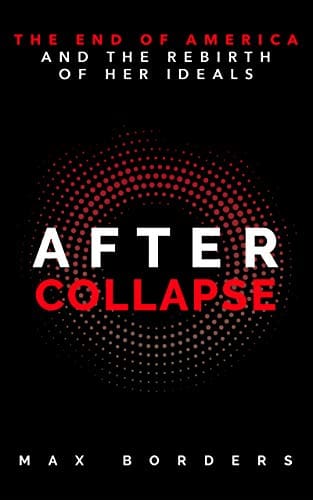 Max Borders is an advisor to The Advocates. Thanks to that relationship, we got to be the first to sit down with Max for an interview since the release of his new book, After Collapse: The End of America and the Rebirth of Her Ideals. From our perspective, this is the most promising book on the idea of self-government in a decade. – The Editors
Max Borders is an advisor to The Advocates. Thanks to that relationship, we got to be the first to sit down with Max for an interview since the release of his new book, After Collapse: The End of America and the Rebirth of Her Ideals. From our perspective, this is the most promising book on the idea of self-government in a decade. – The Editors
—
Editor: Let’s start with one of the main themes of this book: fear. One of the things I learned in After Collapse is that fear drives social and economic collapse more than the other way around. Can you tell us a little more about that idea?
Max Borders: Human beings are born with certain dispositions that will cause us to act together in different ways to survive. I call these “human systems.” Whole cultures can architect entire systems around the various responses to fear, but they don’t always know they’re doing it. We’ve seen this throughout most of history. We want to make the fear go away, so we accept unhealthy tradeoffs with political power in order to feel safer.
Editor: Can you be more specific?
Max Borders: Sure. I’ve had this book in my mind for a while, but it was informed by both hysteria and heroism amid the 2020 pandemic. I noticed a profound contrast between the innovators and the entrepreneurs on the one hand, and so-called “experts” and officials on the other. The continuous failure of bureaucracies to perform well was evident — from lockdowns to confusion about whether or not to wear a mask. The FDA demanded proof of vaccine efficacy in an emergency, which created a massive ‘invisible graveyard’ of unsaved lives. Vaccine distribution was a disaster. It prompted me to ask why it is people are so willing to embrace power hierarchies that are so fragile and ineffective, and so unwilling to have more faith in savvy entrepreneurs and each other.
Editor: Is there anything distinctly American about the way we respond to fear?
Max Borders: The most succinct way to put it is that there is a tendency among Americans to look to “daddy” when something bad happens. Government is like daddy in that government appeals to our force/fighting response when its officials promise to solve our problems with largesse or coercion. But this is the essence of what makes our system fragile. Force and fighting are unsustainable.
Editor: And there are other types of responses?
Max Borders: I call the basic responses “The Four Energies,” which are the four basic ways to respond in a condition of fear:
- Eros Masculine – Force control.
- Eros Feminine – Let it flow.
- Thanatos Masculine – End it now.
- Thanatos Feminine – Let it go.
We are way too dependent on 1 and 3, which means we are habituated to turn to Washington to solve our problems when most problems are almost better solved in decentralized ways. Central hierarchies force control, but decentralized systems let it flow. I half-joke that I agree with radical feminists that we are living in “patriarchy.” The feminists are right, but for the wrong reasons. We need more feminine human systems if we’re going to avoid collapse. And at this stage, it doesn’t look like we will.

Editor: Why would you refer to a hierarchy as both powerful and fragile?
Max Borders: Hierarchies are systems of command and control. They work in certain contexts and at certain scales. But I show readers how hierarchies break down. It has an almost lawlike quality to it, which is to say, all hierarchies are going to break down at certain scales. Rome. Britannia. Why not America, too?
The government is the greatest hierarchy of them all. And even though it is enormously powerful, it is also fragile. The bigger and more comprehensive it tries to be, the more it will suffer in its attempt to control social complexity. This fact will hasten our collapse.
Editor: Collapse is an awfully loaded term. What do you mean by that?
Max Borders: Well, the irony is, I appeal to readers’ fears in order to unpack the idea that fear is the primary driver of collapse. In fact, I spend seven chapters discussing seven different ways American society is breaking down:
- Our socio-economic models are faulty.
- Our hierarchies are strained.
- Our belief in the founding ideals is fading.
- Our systems of mutual aid are dying.
- Our collective intelligence is fractured.
- Our civil discourse is deteriorating.
- Our government is in debt and disorder.
Just one of the above challenges would be bad enough. But we are experiencing deep social fracturing. And the illusion that the same entity that put a “man on the moon” is going to save us is beginning to dissolve. If it doesn’t soon dissolve, it will break down.
Editor: Number 7 — our government is in debt and disorder — seems obvious to most readers, but what about 4?
Max Borders: Mutual aid is, indeed, dying. It has been for almost a century. Did you know that one in four Americans used to belong to a mutual aid organization? That number is negligible today. The reason is, most Americans have outsourced their compassion to distant capitols. I don’t need to talk about the tsunami of red ink that props up our major entitlement programs, which will probably be insolvent soon. It’s time for a little healthy Thanatos Feminine: let them go.
What’s most tragic is that after nearly 100 years of the welfare state, we have forgotten how to look after each other in a system of mutual aid. After the collapse, of course, my hope is that they enjoy a renaissance. Otherwise, we will be doomed to the same pattern of failure.
Editor: And what about liberalism? You say we’ve lost our belief in liberalism.
Max Borders: Right. And to be clear, I mean the liberalism of Adam Smith and David Hume, not the liberalism of FDR. It’s a commitment to the idea that freedom fills all things with light. We are losing it in this country. Most partisans are two illiberal factions warring over whether the welfare state or the warfare state should prevail. Few ask whether either should prevail.
Editor: Despite some of the darker parts of the book, there is a lot of optimism in After Collapse.
Max Borders: Yes, this is meant to be a guidebook for the post-collapse era. I don’t go in for the kind of disaster pornography that passes for non-fiction these days. And yet I’m competing with other disaster narratives. If you only read Part One, you might close the book feeling pretty despondent. But in Part Two, I try to show the way out of the mess we’re in. My sincerest wish for my kids is that they don’t have to endure collapse. (But if they do, at least they can use my book to make a cookfire one night.) No seriously, I present some ideas for how we can be more antifragile.
Editor: You present some ideas that might seem pretty radical to some readers. What is the most radical of them all?
Max Borders: Funny thing is, I build on the most radical ideas of the American Founders. They were geniuses. But interestingly, I also marry those with the ideas of the Vedics, too. (Hinduism, Buddhism, and Jainism). Probably the most radical thing I challenge in the mind of the Western reader is to see the concept of non-violence not so much as a principle, but rather as a daily practice of heart and mind. To many, this might seem weird. But I have come to believe that politics is a dead letter. The real action lies in subversive innovation and a daily commitment to practice.
The secret to winning the world for human freedom is for enough people to turn within themselves — to embrace the active practice of nonviolence (or nonaggression) in thought, word, and deed. In so doing, we become more powerful and more fluid. As each of us masters our practice, we join together. Then we find ways to underthrow political power. The freer and more prosperous we’ll be.
Editor: Thank you so much for your time, Max.
Max Borders: It was my pleasure. And I look forward to watching The Advocates continue to expand and thrive.
Editor: Max Borders is the author of After Collapse and The Social Singularity.

























